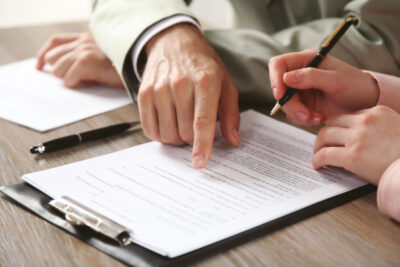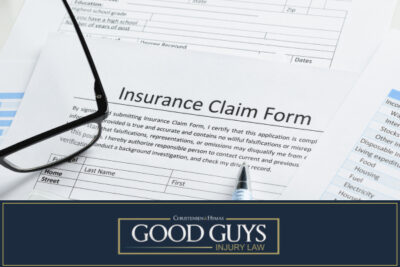
If you’ve been in an accident in Utah, you must submit a claim to insurance to receive the compensation you deserve.
At Good Guys Injury Law, we want to help make the process easier. Our team of dedicated accident attorneys wants the best possible outcomes for our clients, and that means holding the responsible parties accountable.
We are familiar with the intricacies of personal injury protection, not just for property damage but also for pain and suffering. Let us handle this challenge and help you recover from your bicycle accident. We hold those responsible liable for your injuries. Of course, seek medical treatment first. Then, contact us to schedule a free case review.
Table of Contents
What is an Insurance Claim?
Claims are requests made to insurance companies for coverage or compensation following a loss or injury. Filing a claim can cover many types, from property damage to personal injuries. We can help you determine whether you file your claim with your insurance company or the driver.
The insurance company reviews the claim, evaluates the damages, and determines the amount of compensation based on the policy terms. Knowing the details of your insurance policy and the claims process is essential for a successful outcome and compensation for lost wages.
How To Claim Insurance: The Process

An insurance claim for a bike accident involves notifying your insurer about the incident and requesting financial reimbursement for damages or injuries. You provide evidence of the accident, complete the required forms, and cooperate with the insurance company’s investigation.
Reimbursement from a claim can help cover medical expenses, repair costs, and other losses. You must comply with the processes if you want your bicycle accident claim to be processed smoothly and efficiently.
Be aware of your insurance coverage before you call them. An experienced attorney can help you find any actions your insurance company could take to save the company money. Our law firm can guide you through the process. Some of the key steps include:
- Notifying the Insurer: Once you feel ready to discuss your involvement, inform your insurance company about the accident. Let them know about the crash, but let us negotiate.
- Providing Evidence: Submit photos, witness statements, and other documentation like medical bills for your personal injury case. Make sure you have the other party’s insurance company name and number. The at-fault driver’s name and place of employment are useful to have.
- Completing Forms: Fill out and submit the required claim forms accurately if you want personal injury protection benefits.
- Cooperating with Investigation: Respond to any questions from the insurance company or adjuster. Contact us if the adjuster contacts you.
Immediate Steps After an Accident
Knowing and evaluating the steps to take with bicycle accident lawyers can significantly impact your claim and the related expenses.
Prioritize safety and seek compensation for medical bills, gather necessary information, and document the scene thoroughly after the cyclist or bicycle accident. These actions will help you make a stronger claim and help you get a fair settlement.
It is better to do this immediately, even though Utah has a four-year deadline for negligence lawsuits. Be liable for your own insurance case.
Make Sure You Are Safe and Have No Injuries
Your safety and health are the top priorities. Check on the safety of others and find out if anyone else is hurt. Even if you feel fine, consider seeing a doctor to rule out hidden injuries.
Your well-being comes first, and you must see a doctor immediately. Consider seeing a mental health professional as well. It is not unusual for people to have anxiety after an accident.
Gather Evidence and Document the Scene
Financial compensation for an accident can also include non-economic damages. The more evidence you gather against the at-fault driver, the more compensation you might receive.
Take photos of the crash scene, including vehicle positions, damages, and any visible injuries. Clear and detailed images are essential for providing crucial evidence to support your claim. These photos can help establish the extent of the damage and the circumstances of the accident.
Collect contact details from any potential witnesses at the scene. Exchange information with other involved parties to provide your attorney with additional perspectives that support your version of events. Witness statements can be invaluable in corroborating your account and strengthening your case.
Document the time, date, location, and weather conditions during the accident. Although it may seem time-consuming, detailed notes will help create an accurate accident report, aiding you and your attorney in building your case.
Additionally, obtain the other party’s car insurance information, as it will be necessary when filing a claim. Keep a log of conversations with other parties involved and law enforcement, as this information can be useful for future claims.
Reporting the Accident to the Police

After ensuring safety and gathering evidence, report the bike accident to law enforcement. A police report will be the official account in detail of the accident, which can be invaluable for your insurance claim. These crash details will help determine the fault.
Make sure you get a copy of the police report for your records. Keeping this record will help your case if it goes to court.
Notifying Your Insurance Company
Once the accident has been reported to the police, you can call your insurance company and notify the incident. Be mindful of the information you share and be as transparent as possible.
If you are unsure what an insurer will need from you, let an attorney at Good Guys Injury Law help you with any doubts before your insurance claim.
Understanding Your Insurance Policy
Reviewing and comprehending your insurance policy is key. Your policy outlines the coverage, exclusions, and claim limits that apply to your situation. Knowing these details helps you set realistic expectations and avoid surprises during the claims process.
If you have any questions about your policy, contact your insurance provider for clarification.
Steps to File a Claim
- Review Your Policy: Know what is covered and the limitations.
- Gather Evidence: Collect photos, witness statements, and other relevant documents.
- Notify Your Insurer: Report the accident and provide initial information.
- Complete Claim Forms: Fill out the required forms accurately and thoroughly.
- Submit Supporting Documents: Provide all important documentation to support your claim.
- Cooperate with Adjusters: Be responsive and cooperative during the investigation.
- Follow Up Regularly: Stay in contact with your insurer to monitor the progress of your claim.
Follow-Up With Your Claim
After submitting your claim form, follow up regularly with your insurance company. Ensure they have received all the documents and inquire about the status of your claim.
Persistence and proactive communication can help expedite the process for bike accidents. Keep detailed records of all related interactions and expenses for future reference.
Negotiating with Insurance Adjusters

Insurance adjusters play a key role in evaluating your claim. They assess the damage, determine fault, and calculate the compensation amount. It’s essential to cooperate with them while protecting your interests.
Good Guys Injury Law can assist you in dealing with insurance adjusters, ensuring your rights are upheld, and the process runs smoothly.
Evaluation Process, Negotiation, and Determination of Claim Value
During the evaluation phase, the adjuster reviews all submitted evidence to assess the extent of damages and injuries. This includes examining medical reports, repair estimates, and other relevant documents to form a comprehensive understanding of the claim.
In the negotiation phase, the adjuster and the claimant discuss the claim’s value. It’s common for initial offers to be lower than expected, making negotiation a critical step in securing fair compensation. Both parties will present their cases and work towards a mutually agreeable settlement.
The final determination of the claim value is based on the outcomes of the evaluation and negotiation phases. It is crucial for the claimant to understand the basis of this determination and ensure they agree with the compensation amount before accepting the offer.
Tips for Communicating with Adjusters
- Be Honest and Accurate: Provide truthful and precise information. Misleading details can harm your credibility and affect your claim.
- Keep Records: Document all communications with the adjuster, including dates, times, and topics discussed. Record keeping helps maintain a clear history of your interactions.
- Stay Professional: Remain calm and polite, even if negotiations become challenging. A professional demeanor can positively influence the process.
- Seek Legal Advice: Consult a personal injury attorney for guidance if you feel unsure or overwhelmed. Legal expertise can be invaluable in complex cases. It’s always better to let us handle your negotiations with the insurance adjuster.
Dealing with Claim Denials
If your claim is denied, don’t lose hope. You can take steps to appeal the decision and seek a favorable outcome. Understanding the reasons for denial and following the correct appeal procedures can help you resolve the situation.
Common Reasons for Claim Denials
Companies can deny insurance claims for various reasons, such as insufficient evidence, policy exclusions, or missed deadlines.
Sometimes, the insurer may dispute the cause of the accident or the extent of damages. Knowing these potential pitfalls can help you prepare a stronger case.
How to Appeal a Denied Claim
To appeal a denied claim:
- Start by reviewing the denial letter to discover the specific reasons.
- Gather additional evidence or documentation to address these issues.
- Submit a written appeal to your insurer, explaining why the denial was incorrect and providing supporting evidence.
Consulting with an attorney can boost your chances of a successful appeal.
Final Steps and Follow-Up for an Insurance Claim
Once your claim is approved, there are still important steps to follow. Maintain communication with your insurer to address any remaining issues or questions. Keeping thorough records of the entire process is also beneficial for future reference.
If the insurance company reaches out to you again, contact us for help.
Contact Our Salt Lake City Bike Accident Lawyer for a Free Case Consultation

At Good Guys Injury Law, we are here to help you handle all stages of your claim and secure the best possible outcome. We can help you secure compensation for lost pay, medical bills, and even pain and suffering damages.
Contact us for a free consultation to learn how we can assist you before or after your insurance claim process.
